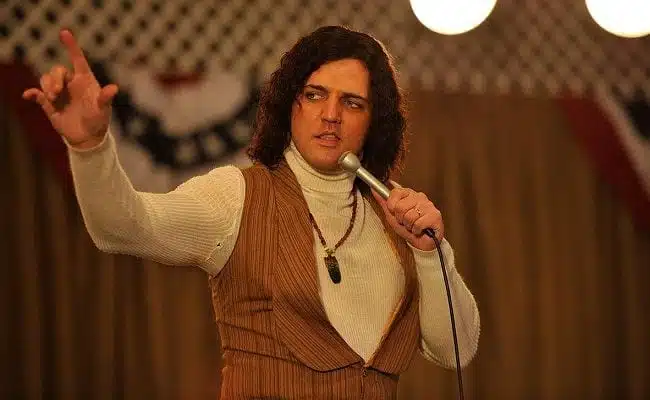
The Identical wants to be everything to everyone. It wants to be a Christian-driven inspirational film like noted 2014 box-office success God’s Not Dead. But it also wants to be an award-caliber biopic, which, despite not featuring anything licensed by Elvis Presley’s estate, makes up for this by somewhat adapting the King’s story while retaining his likeness to an eerie degree. By trying so hard to check off so many boxes on its list of target demographics while satisfying none of them, The Identical ends up becoming nothing more than a celluloid sedative, incapable of offending, inspiring, or being even remotely entertaining.
Opening on a very dour note about a struggling Christian couple who reluctantly give one of their two twins to a traveling pastor (Ray Liotta) because they only have the means to care for one, the film goes on to tell the story of this boy, Ryan Wade (the bland Blake Rayne) and his quest to become a musician despite the pushback he receives from his father to go into the ministry. When not getting into all sorts of PG-rated trouble with his friend Dino (Seth Green, here because bills need to be payed), Ryan eventually stumbles upon his destiny when he hears the inexplicably-named Drexel Hemsley on the radio, an Elvis-styled early rock superstar who is definitely not Elvis — and look, the movie even makes a one-time passing reference to Elvis in the script, so don’t worry… this is an original creation. Ryan eventually only gets gigs as a Drexel Hemsley impersonator and becomes successful, but he wants to add his own songs to the routine. Well, if you’ve seen any musician biopic in the past two decades, you know exactly how the story works out.
Most people that are only vaguely familiar with Elvis’ story may not know that early on his career, the King wound up having quite a bit of success with some more “niche” market recordings. His Christmas and gospel albums remain great catalog sellers decades down the line. His manager, the famed Colonel Tom Parker, was a savvy businessman and knew there was value to playing to multiple demographics, but Elvis absorbed a lot of gospel music in his upbringing, and idolized numerous circuit singers and their stylings, which is one of many factors that helped inform his own singing voice. There is actually a lot to explore in Elvis’ life story when it comes to his faith, but The Identical doesn’t aim for specifics. Instead, it goes for the most generic sentiments possible, with puppy love and and obligation to family being the driving themes of the film. The moral is still unclear by the time the credits roll.
Again, if you’re going to use Elvis’ voice, style, and likeness down to a T but not actually have any part of your story be about Elvis except for only the faintest of whispers, why even bother? The DVD’s special feature about what went into the creation of the original music fails to answer this question.
In trying to evoke the era, The Identical unleashes a bevy of original songs, all of them undercooked and featuring production tricks that feel two decades removed from their era. No matter how you try and contextualize it, canned horns from the ’80s still sound like canned horns from the ’80s, even when you’re trying to recreate the sound of Sun Records in the early days. While “classic rock songs” like “Boogie Woogie Rock and Roll” and “Bee Boppin’ Baby” are as forgettable as you’d expect, the surf number “Sunrise Surfin'” and the perplexing “Gypsy Man” get particular kudos for being especially awful, never once circling anything resembling a memorable chorus. Writer Howard Klausner has written more than a few films with deeply Christian messages (his most famous script being that for the 2000 Clint Eastwood feature Space Cowboys), but his lack of knowledge about how music works or is received borders on downright stunning in its ignorance.
By trying to please everyone, The Identical pleases none, covering its Christian sentiments in so much generics that they’re barely visible. The movie will no doubt infuriate music fans with its piss-poor original songs. Outside of some decent production design that evokes the era, this flick features weighty, bland direction that turns overly sappy on a dime. At least Ray Liotta and Ashley Judd feel like they’re trying to make the most out of their time on screen, their performances ringing as earnest despite the lead weight of the material they’re presented with.
Worst of all, however, is that despite the toxic reviews that greeted it upon its release, The Identical isn’t even fit for good midnight-movie watching, never once crossing over into the realm of the truly ridiculous (although Ryan’s verbal arguments with his manager are delightfully wooden). The film instead keeps its scenes modest in scale and scope, so determined to tell its fictional story with as much dramatic heft as possible that it forgets to have any sense of fun at all.
Ultimately, The Identical is as egregious a cinematic misfire as could be imagined, bumbling its message, its music, and even in its spiritual intent during its ingratiating 107 minute running time. It’s not a movie that’s so bad it’s good, no; it’s a film that’s so bad it turned good and then went straight back to being just plain-old-bad again. You have better things to do with your time than worry about the fact that this exists.

